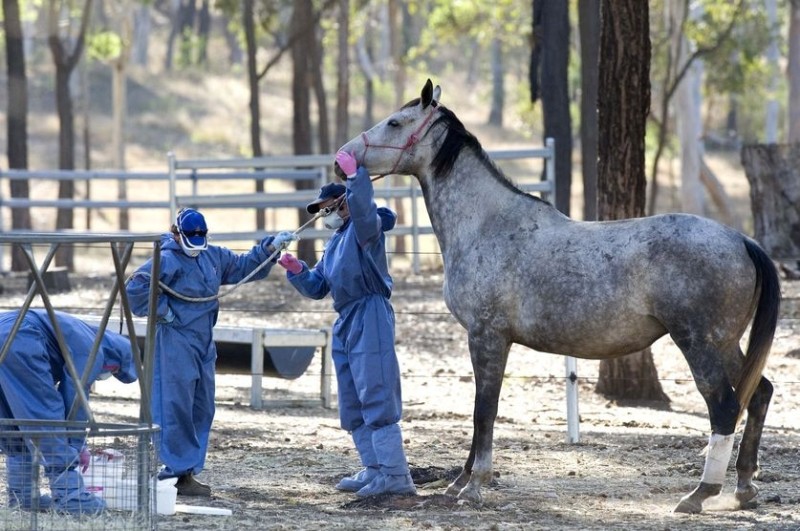Hendra
SB Vets have certified vets that can vaccinate your horses against Hendra Virus today!!!
SB Vets protocol for treating horses:
Bio-Security Queensland have recently introduced new & expanded guidelines for all veterinarians that detail strict protocols that must be adopted when treating any sick horse. Of particular importance: IF HENDRA CAN NOT BE RULED OUT, THEN IT MUST BE RULED IN.
Hendra is a Bio-Security level 4 virus (Falling into the same catergory as EBOLA) that attacks multiple organ systems in the body. As a result, it can present with a wide variety of very common clinical symptoms that include but are not limited to the symptoms on the left hand side of this handout. You will be aware that through the course of the year, veterinarians are presented with many horses that exhibit a range of these clinical signs but do not have Hendra. Unfortuneately, since this new ruling came into place, veterinarians can no longer treat any of these medical symptoms as we normally would have, without first ruling out the possibilty that the horse may have Hendra.
In order to carry out an Exclusion test, the veterinarian and his/her assistant, is now required to dress in FULL PPE & take multiple smaples to submit to the laboratory at your expense ( inc. Courier fees.) The turn around time to get results varies from 1 to 4 days due to the Bio Lab not opening on weekends and our rural location. Under the new regulations, until a NEGATIVE test result is returned, a vet cannot expose the owner, trainer or manager of the horse or him/her to the possible risk of Hendra infection by providing any further diagnostic services or treatment other than in the form of drugs that can be safely administered from a distance in the feed. Diagnostic tests and treatments such as stomach tubing, scoping, rectal & IV injections have been ruled by Bio-Security Queensland as "unsafe" until such time as Hendra has been eliminated as a possible diagnosis.
The result of these new regulations is that unvaccinated horses are now being forced to wait for extended, sometimes life threatning periods before appropriate diagnostic services and treatment can be implemented.
In the future the only way to ensure that your horses can receive prompt & appropriate veterinary care when they need to is to ensure that they have been vaccinated against Hendra. Queensland Health, Bio-security QLD & Workplace Health & Safety are extremely serious about ensuring that these regualtions are adhered to. This has been demonstrated by the recent prosecutions of vets who treated sick unvaccinated horses & did not adhere strictly to these guidelines. These vets now face POSSIBLE CRIMINAL CHARGES, LARGE FINES & JAIL TERMS IF CONVICTED. We would be grateful if you could respect our position with regards to these new regulations when deciding whether or not to vaccinate your horse, & refrain from asking or expecting our vets to put their lives at risk by treating your unvaccinated horse.
Further, we wish to advise you that with effect from July 1st 2016 the Bio-Security Act will also outline your general Bio-Security obligation:
ALL PERSONS (YOU) WHO DEAL WITH BIOSECURITY MATTER (HORSES) OR A CARRIER, AND KNOW OR OUGHT TO KNOW THAT IS POSES A BIOSECURITY RISK (HENDRA) , MUST TAKE ALL REASONABLE & PRACTICAL MEASURES ( VACCINATIONS/USE OF PPE) TO PREVENT OR MINIMIZE THE RISK TO YOURSELF & OTHERS.
It is therefore possible, that in the fullness of time, you may also face possible prosecution for failing to protect yourself, your family, or our staff from this deadly disease if you do not comply with your bio-security obligation. We would therefore like to take the opportunity to urge you to vaccinate any horse in your care, so that we can provide you & your horse with the best possible treatment in a timely & cost effective manner.
After the initial course of vaccinations and following a 6-month booster, Hendra vaccinations can now be given on a yearly basis. Please call our friendly staff to book an appointment to have your horse Hendra vaccinated.
Hendra Virus is a disease that was first identified in 1994 and has only been found in Australia. It occurs naturally in flying fox populations, and it’s thought to be transferred to horses through contaminated urine, faeces or foetal fluids. Humans become infected through close contact with infected horses. There’s been no evidence of direct infection from flying foxes to humans or of human-to-human infection. Horses can infect other horses as well as humans.

